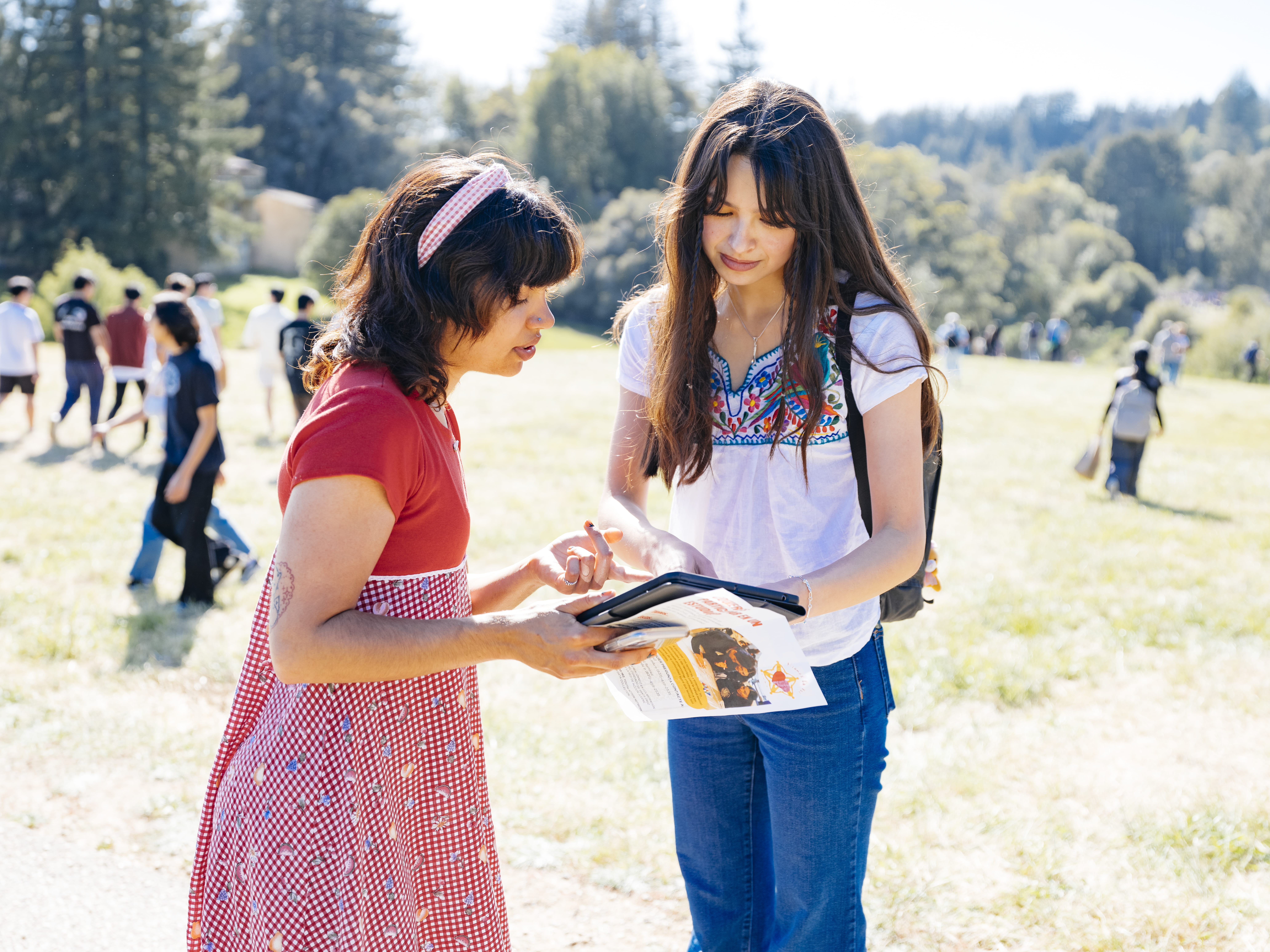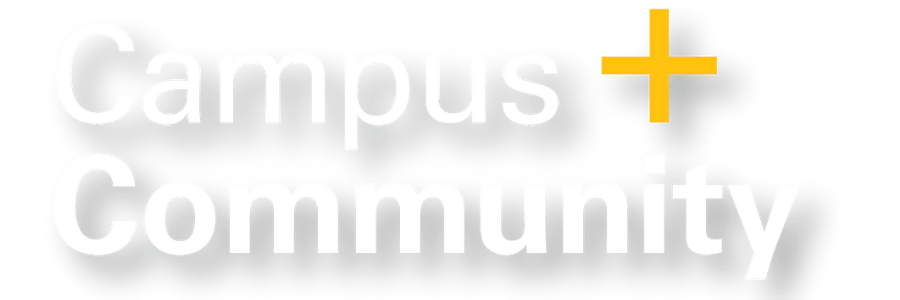
Student Toolkit

UC Santa Cruz has a range of opportunities for community-engaged work available to undergraduate students! Through community-engaged work, students collaborate in various ways with local communities, organizations and groups to address real-world matters.
Engaging with communities allows you to develop a deeper understanding of social issues, enhance your research and problem-solving skills, foster meaningful connections with diverse groups, and apply your knowledge and talents to create positive change. Whether you are passionate about education, environmental sustainability, social justice, or any other cause, these opportunities can give you the space to pursue your interests alongside others striving to make a difference. If you do not see an opportunity that you believe belongs on this page, please reach out to us!
Engaged scholarship clubs and programs
Right Livelihood: A partnership between UCSC and the Right Livelihood Foundation, the Right Livelihood College Campus Santa Cruz links faculty and students with the “Alternative Nobel Prize” winners for research and education about proven solutions to the world’s most pressing global problems.
UCSC Praxis Club: Student-led org centered around Critical Service Learning & Social Justice Engagement.
Follow them on Instagram and join their Mailing List for more information.
Engaging Education (E2): Conscious movement by students at UCSC toward owning their education through student leadership and student agency.
Find more information through their Linktree.
Everett Program: Works towards connecting young leaders to empowered communities, where together they can use tech and communication to help build a just and sustainable world.
Opportunities in the colleges
- Oakes College | CARA Program: Community-Based Action Research & Advocacy. Teaches skills relevant for community organizing and social justice. Instagram and Link Tree.
- John R. Lewis College | (H)Acer Program: Apprenticeship in Community-Engaged Research, Alternative Spring Break
- Rachel Carson College | Sustainability Lab
- Merrill College | Classroom Connection, Field study
- Cowell College | Center for Public Philosophy, includes the Ethics Bowl
Internships and community-engaged research resources
Other opportunities on campus
Tips for excelling in internships and research positions
- Stay organized: Keep track of deadlines, tasks, and research findings in a way that makes sense to you and your supervisor. This can be done through spreadsheets, google calendar, google drive, or other task tracking softwares like notion.
- Communicate effectively and ask questions: Interning often involves collaborating with others, including colleagues, participants, and other stakeholders. Be professional, but also be yourself. We are all normal people with a common goal. With that being said, do not be afraid to ask questions and be vulnerable. Engaged work is about working together to create positive change.
- Show initiative: Look for ways to contribute beyond your assigned tasks. If you notice a problem or an opportunity for improvement, bring it up to your supervisor and offer potential solutions.
- Familiarize yourself with the research: Take the time to read and understand the research being conducted by your supervisor and their team. This will help you contribute more effectively to the project.
- Be detail-oriented: Research often involves collecting and analyzing large amounts of data. Pay close attention to the details, take accurate notes, and double-check your work to ensure accuracy.
- Be respectful: Research often involves working with vulnerable populations, such as individuals with disabilities or marginalized communities. Be respectful of their needs and experiences, and follow ethical guidelines and protocols.
- Be open to learning: Research is a constantly evolving field, and there is always more to learn. Take advantage of every opportunity to attend workshops, conferences, and other professional development opportunities.
C+C Book Recommendations

Emergent Strategy: Shaping Change, Changing Worlds – Adrienne Maree Brown
(AK Press, 2017)
The first book by writer, activist, and facilitator Adrienne Maree Brown, Emergent Strategy is as much about personal transformation as social transformation. Inspired both by her experience as an organizer and activist in New York and Detroit, and her reading of the visionary speculative fiction of Octavia Butler, Brown writes a manifesto for collaborative community-building and change-shaping. Practical and poetic, Emergent Strategy is a touchstone for many working toward transformative change in our crisis-filled world.

Ground Truths Community-Engaged Research for Environmental Justice – Chad Raphael, Martha Matsuoka (eds.) (University of California Press, 2024)
This is the first book devoted entirely to summarizing the body of community-engaged research on environmental justice, how we can conduct more of it, and how we can do it better. It shows how community-engaged research makes unique contributions to environmental justice for Black, Indigenous, people of color, and low-income communities by centering local knowledge, building truth from the ground up, producing actionable data that can influence decisions, and transforming researchers’ relationships to communities for equity and mutual benefit.

Building Collective Leadership for Culture Change: Stories of Relational Organizing on Campus and Beyond – Maria Avila (Cornell University Press, 2023)
Building Collective Leadership for Culture Change shows how five community engagement research projects in the greater Los Angeles area were able to create more collaborative and participatory cultures in their academic institutions and nonacademic settings by using community organizing, research in action, and narrative inquiry.

The Engaged Scholar – Andrew J. Hoffman (Stanford Briefs, 2021)
In this brief but compelling book, Hoffman draws upon existing literature and personal experience to bring attention to the problem of academic insularity—where it comes from and where, if left to grow unchecked, it will go—and argues for the emergence of a more publicly and politically engaged scholar. This book is a call to make that path toward public engagement more acceptable and legitimate for those who do it; to enlarge the tent to be inclusive of multiple ways that one enacts the role of academic scholar in today’s world.

Transformative Critical Service-Learning: Theory and Practice for Engaging Community College and University Learners in Building an Activist Mindset – Heather Coffey and Lucy Arnold (Myers Education Press, 2022)
Transformative Critical Service-Learning offers hands-on tools for implementing, reflecting on, and assessing critical service-learning in classrooms and community spaces. Answering a need from practitioners for a practical tool for making sense of critical service-learning, the authors introduce the Critical Service-Learning Implementation Model as a way to encourage conversations among stakeholders.
National and state organizations supporting engaged research
LEAD California – a statewide nonprofit organization supporting half a million university and college students, administrators, faculty, staff, and community members who, with our resources, expertise, training, and connections are creating innovative ways to ensure a healthy, just, and democratic society.
Imagining America – The Imagining America consortium (IA) brings together scholars, artists, designers, humanists, and organizers to imagine, study, and enact a more just and liberatory ‘America’ and world. Working across institutional, disciplinary, and community divides, IA strengthens and promotes public scholarship, cultural organizing, and campus change that inspires collective imagination, knowledge-making, and civic action on pressing public issues.
International Association for Research on Service-Learning and Community Engagement (IARSLCE) – The Association promotes high quality trans-disciplinary research across a wide range of approaches and forms and builds the capacity of scholars, practitioners, and community partners to engage in such research.Campus Compact (national)
Urban Research Based Action Network (URBAN) – URBAN is a multidisciplinary, distributed network of scholars and practitioners committed to articulating and strengthening the collaborative methods and impact, sharing findings, raising the visibility, developing career pathways and increasing the acceptance within the academy of community-based research.
